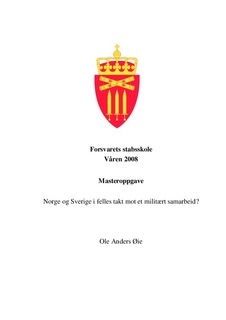Norge og Sverige i felles takt mot et militært samarbeid?
Master thesis
Permanent lenke
http://hdl.handle.net/11250/99928Utgivelsesdato
2008Metadata
Vis full innførselSamlinger
- Masteroppgaver [466]
Sammendrag
A bilateral military co-operation between Norway and Sweden has essentially required handling security challenges and rising costs. In addition, during recent years it has been revealed that cooperation with other nations is a prerequisite to obtain operational influence in multinational operations. These operations have required military forces with a high level of interoperability, to get the necessary fighting power. The aim of this study is to describe each country’s understanding of the use of military forces, and then compare them. It is also to present an unbiased assessment of what kind of implications co operation between Norway and Sweden may have on military interoperability. To achieve this intention, I have chosen to focus on contemporary military strategic and operational doctrines in Norway and Sweden by addressing the following questions:
- What is the Norwegian understanding of the use of military forces?
- What is the Swedish understanding of the use of military forces?
- What kind of differences and similarities exist between the Norwegian and Swedish understanding of the use of military forces?
The analysis indicated both similarities and differences between the Norwegian and Swedish understanding. I have focused on the differences. As basic tools in this study I have used NATO`s classification of interoperability and British reflections on what shapes an effective fighting power. The study has discovered that the two countries` understanding of the use of military forces does not form an acceptable basis for their military forces to be interoperable. Through different use of definitions and theories, implications are revealed as to the development and use of military forces, e.g. lack of common doctrines. These implications will reduce the general understanding which is necessary in a military co-operation. In its turn this may reduce the core interoperability. The study shows that if military co-operation is to be useful, it is important to have a common understanding of the doctrines that constitute the basis for military co-operation
